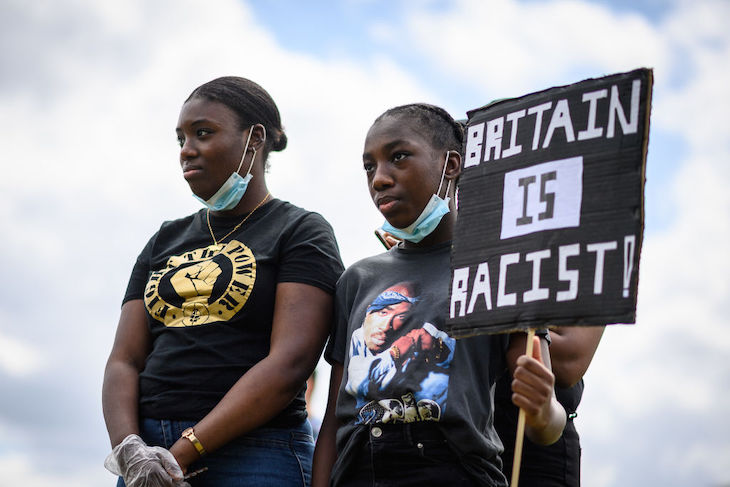Is Britain racist? At times, you’d be forgiven for thinking so. In recent years, our country has experienced considerable turbulence on the subject of race and equality. The spread of the American Black Lives Matter movement on these shores in the summer of 2020 – which led to protests from the Isle of Wight on England’s southern coast to Scotland’s Shetland Islands – contributed towards an acceleration in race-focused thinking. Yet the reality is that Britain is a tolerant place in which race does not usually hold people back.
Ethnic minorities in the UK regularly outperform the white-British population in various spheres of life
Ethnic minorities in the UK regularly outperform the white-British population in various spheres of life. Indulging in footballing analogies, the non-white Indian and Chinese ethnic groups are the Manchester City and Liverpool of socio-economic integration, from their impressive levels of school attainment to professional successes in the labour market. Their achievements are something to celebrate. And yet this success is not always, of course, emulated by those from other ethnic groups. Parts of the once-dominant white-British mainstream have certainly struggled to regain the sense of purpose and belonging they had before the era of pre-industrial decline.
The portrait of modern Britain is an ever-changing and complicated one – a picture which is anything but as black-and-white as some portray it. In the words of Sir Trevor Phillips, ‘the traditional orthodoxy that life chances are determined by a simple black and white binary has been overturned by the study of detailed data’.
In England’s school system, multiple non-white ethnic groups – including Chinese, Indian, Bangladeshi, and Black African – perform better at Key Stage 4 than their white-British peers. In the labour market, some Asian and Indian-heritage workers earn more on average than the white-British mainstream. British Indians now have the highest rate of home ownership in the UK.
Yet instead, all too often we are confronted with the hopelessly simplistic (and divisive) narrative of ‘oppressive whites vs. oppressed non-whites’. While these misguided theories may have been embraced in good faith by those who genuinely believed they were fighting the good fight by flying the flag of racial justice, much of this clearly wasn’t welcomed by the British public. A November 2020 Opinium poll after the wave of BLM summer demonstrations found that 55 per cent of people – including a plurality of ethnic-minority Britons – believed that the movement had increased racial tensions.
Fast-forward four years and we now have a Labour government which, earlier this year, proposed a new Race Equality Act. This approach seems misguided, not least, of course, because race is already a protected characteristic under existing equalities legislation. Our anti-discrimination racial protections are also some of the strongest in the world.
Thankfully, Labour appears to have gone quiet on its Race Equality Act since it won the election in July. We can only hope that it never sees the light of day. The truth is that class, rather than race, seems to be a bigger issue that needs addressing; nearly half of the British public are of the view that race is not at all important in determining one’s ability to succeed in modern Britain (48 per cent). This figure plunged to 25 per cent on the subject of class, according to polling for a new report by Policy Exchange, ‘A Portrait of Modern Britain: Ethnicity and Religion’. When asked whether race and class is more important to succeeding and doing well in Britain, 58 per cent opted for class, with only 13 per cent choosing race. This follows a 2019 Social Mobility Commission (SMC) poll which found that the majority of people – 77 per cent – thought there was a large gap between the social classes in Britain. While race continues to dominate conversations on fairness and equality, many Brits – including those from ethnic minorities – believe that social class is more important in influencing life trajectories in modern Britain.
What is clear is that the UK has made significant strides when it comes to race relations, to the point that racial identity is no longer always an effective predictor of socio-economic success in modern Britain. But the UK remains a land where class-based disadvantages and regional disparities continue to persist, not least when it comes to accessing high-quality schooling and career advice.
The reality is that some of the most materially deprived, socially atomised, and culturally marginalised neighbourhoods in modern Britain have few, if any, non-white residents. There is certainly not much ‘white privilege’ to be found in places such as Knowsley and Blackpool, two of north-west England’s forgotten hotspots of multi-dimensional deprivation. It’s true, of course, that not all deprived areas in Britain are similar to these two left-behind places. But these examples – and the view of many Brits that class is what matters – shows that race is not necessarily the determining factor in whether or not you can succeed in modern Britain. Labour needs to wake up to this reality and leave the Race Equality Act where it belongs: on the scrapheap.
Dr Rakib Ehsan is a senior adviser at Policy Exchange







Comments